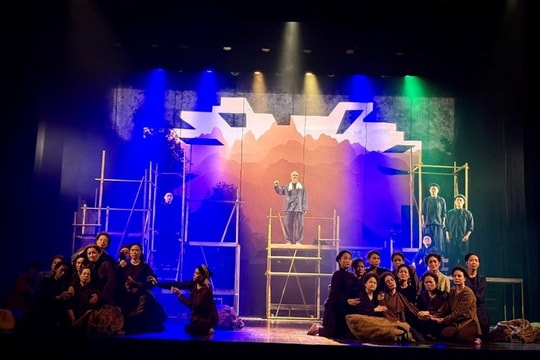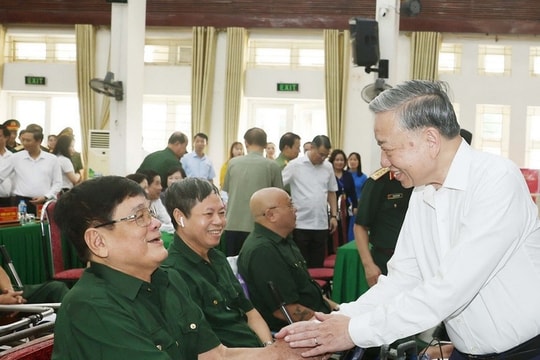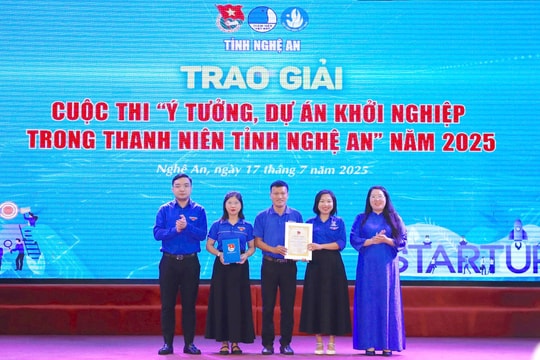Studying and following Uncle Ho in promoting the identity of Nghe An people
(Baonghean.vn) - Nghe An is located in a dangerous area with vast land and harsh climate. Since ancient times, the people of Nghe An have had to struggle with nature to survive and develop. From that hardship, barrenness, and harshness, the virtues of diligence, thrift; steadfastness, courage, determination, ideals, and ambitions; self-confidence, will to progress, and a sense of responsibility in work and in life have been formed.
Those traditional values soon instilled in the young man Nguyen Tat Thanh the good qualities, unique to the people of Nghe An. On the basis of inheritance and tradition of the homeland;life experienceWith many circumstances and cultures; creativity and cultural assimilation, brought him contemplations about life, about people, about fate. Understanding human feelings and pain, Uncle Ho expressed himself in all levels and aspects of life in the simplest, most honest, wise, harmonious and natural way.
 |
Thus, it can be affirmed that the identity of Nghe An homeland is the premise for Him to acquire national culture, approach the quintessence of human civilization, and cultivate the soul, spirit, and character of a great man. From there, creating a cultural style imbued with the essence of Eastern culture, Vietnamese national culture, and the most standard crystallization of Nghe An culture. Therefore,People of Nghe An study BacIt is also to promote good values, traditions, and inherent virtues to assert oneself, to integrate and develop.
Learn from Uncle Ho's will, determination, diligence, extraordinary determination, tireless training, overcoming all difficulties to succeed.
During his decades of activities around the world, Uncle Ho did all kinds of jobs: kitchen assistant, gardener, waiter, snow shoveler, baker... While working, he still diligently studied culture, foreign languages, practiced writing news articles, and became the editor-in-chief and director of the newspaper "The Miserable". After going through 30 prisons and 14 months in prison, his health was already weak, but he was still determined to train and practice mountain climbing to recover his health, and return to the country to lead the revolution. Uncle Ho participated in revolutionary activities, fought on the battlefield, climbed mountains, slept in caves, shared hardships with the people, and sought every way to defeat all the deep and evil plots of the enemy.
The image of constantly learning and researching in any environment or condition has taught us a lesson about the spirit of learning, striving and working hard, overcoming one's own weaknesses and the harshness of conditions and circumstances.
This is also the motivation for each Nghe person to promote their love of learning, their ability to practice, overcome all difficult and harsh circumstances to constantly improve their personality, "to make economic, political, cultural progress... study to build socialism", to build their homeland and province.
 |
| Uncle Ho working in the Viet Bac resistance base. Photo: Document |
Following the example of loyalty, patriotism, integrity and honesty imbued with humanity and character of the people of Nghe An
From the tradition of heroic fighting in building and defending the country, the people of Nghe An stand out with their uprightness, boldness, daring to sacrifice themselves, and readiness to sacrifice for a great cause. This is also the driving force that governs all of his thoughts and actions throughout his life of revolutionary activities, and is the essential basis for him to pursue the goal of happiness for the people. During his time in France, when asked why he voted in favor of the Third International, he replied, "It's very simple. The Third International said it would help oppressed people regain freedom and independence. Therefore, I voted in favor. Freedom for my people, independence for my Fatherland, that's all I want."
In 1944 in Liuzhou, although he was released from prison, he was still under house arrest. He told General Truong Phat Khue, "I am a communist, but what I care about now is the independence and freedom of Vietnam." Until the last years of his life, he wrote in his will“All my life I have served the Fatherland, the revolution, and the people with all my heart and soul. Now, even though I must leave this world, I have no regrets, except that I could not serve longer and more.”
This is a precious heritage, the basis for Nghe An to build a new person for comprehensive development according to Resolution 05-NQ/TU, dated December 14, 2016 of the Provincial Party Executive Committee. The new person must be loyal, upright, have patriotic ideals; have a healthy, simple lifestyle, scientific style, urgency, responsibility, and a spirit of innovation and creativity. The new person must put work first, have personality, ethics, courage, honesty and solidarity, and oppose individualism and opportunism in all forms.
To build new people, we must focus on educating people in all aspects from ethics, culture to personality, comprehensive in morality, intelligence, physique and aesthetics.
Not only learning to assert oneself, to form in each person a spirit of enthusiasm for work and the ability to liberate oneself, "but also having to demonstrate a spirit of passion for learning to constantly improve one's mastery capacity", to rise up and overcome "poverty"The difficulty" of striving to bring the province home"quickly become one of the best provinces in the North"as the sacred wish of President Ho Chi Minh.
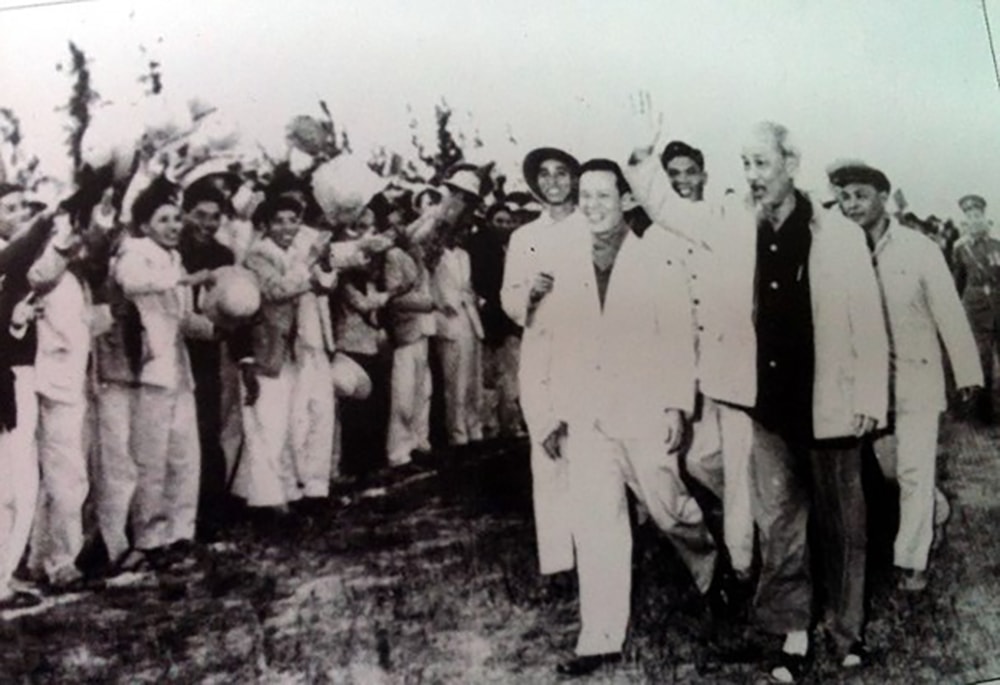 |
| Nghe An people welcomed Uncle Ho to visit his hometown for the second time on December 9, 1961. Photo: Document |
Upholding moral example, simple, exemplary and pure lifestyle
In harsh and difficult circumstances, the Nghe people have created special virtues: diligence, thrift, simplicity, purity, and rusticity. This is the foundation for Uncle Ho to inherit and promote, creating the pinnacle of moral personality, a noble, simple lifestyle, diligence, thrift, integrity, and impartiality. Even when he became President, he still maintained a people's lifestyle, close to the people, rustic, and simple. He still saved everything with the motto of only using when necessary, within the limits allowed by conditions and circumstances, without waste, extravagance, or ostentation.
After liberating the capital in 1954, returning from the war zone, he refused to stay at the old Governor's Palace and moved to an electrician's room, which lacked wind and light, and was as hot as a furnace in the summer. In 1958, following Uncle Ho's request for simplicity, speed, and economy, a simple house was built next to the pond. That house has gone down in history, as a place that brings together the simplest and greatest things of a leader. Not only was it a place to live, but Uncle Ho's style and lifestyle were also very simple, familiar, without any privileges of a President. When visiting his people, he also waded into the fields to pedal the water wheel with them; still wearing the same worn-out brown shirt, still wearing the same worn-out, old rubber sandals...
American journalist David Stamp wrote in his book “Ho” (1971) that“...Mr. Ho's simplicity is a strength. The higher his position, the more simple and pure he is...”.Today, on the basis of those good cultural identities, we learn from Uncle Ho not only diligence, hard work, self-reliance, self-strengthening, but also the level of thinking, initiative, quick grasp of information, situation assessment, dynamism, creativity in life, in work, in practice. Thrift is not only the consciousness of saving in life, in clothing, in enjoyment, but also requires alertness, sharpness in the face of all temptations, proactively seizing opportunities, effectively competing to enrich oneself and the homeland.
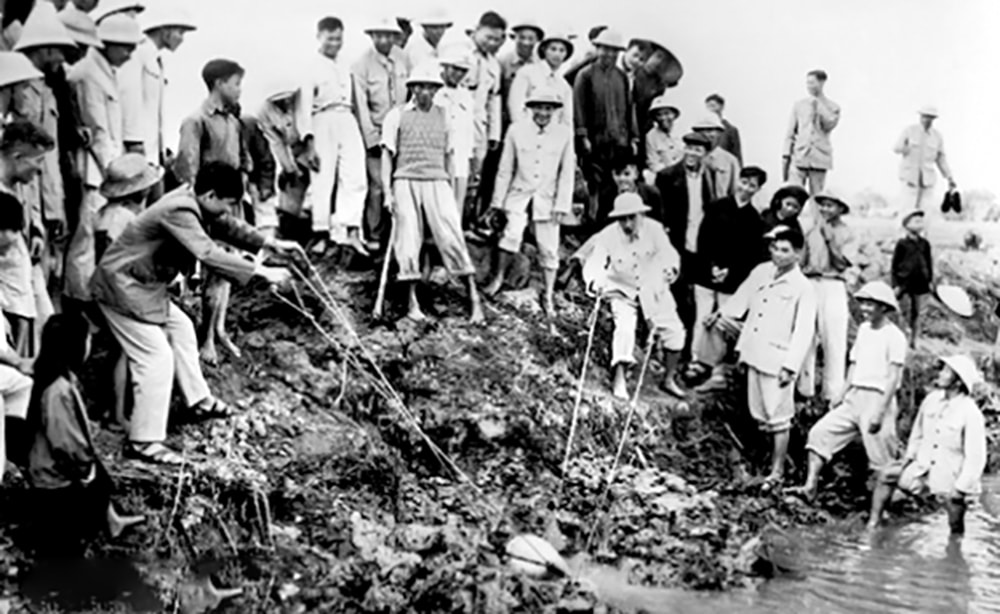 |
| Uncle Ho bailed water to fight drought with farmers in Quang To field, Dai Thanh commune, Thanh Tri district, Hanoi, January 12, 1958. Photo: Archive |
Learning from Uncle Ho about the art of diplomacy: principles,decisive, confidentButsoft, gentle
The spirit of sharing hardships, solidarity, and patriotism of the homeland's tradition has shaped for him a diplomatic style that is harmonious, natural, sincere, humane, and tolerant. In diplomacy, Uncle Ho always has subtle and appropriate methods to solve specific problems, firm and steadfast in principles but soft and flexible in solutions, cautious but resolute, calm but urgent, profound in theory but very practical. Clearly demonstrated in the strategy of "being constant, responding to all changes".
The August Revolution was successful, but the young government faced numerous difficulties, "hanging by a thread". However, with his ingenious strategy and tactics, he took advantage of all the conflicts between France and Chiang Kai-shek, sometimes making concessions to France to expel Chiang Kai-shek; sometimes making peace with Chiang Kai-shek to free his hands to fight the French, taking time to prepare for a long-term resistance war. He always stood at the peak of understanding, grasping his own situation and that of the opponent, finding his own strengths, limiting the opponent's weaknesses, relying on the righteousness of the revolution, being flexible "knowing the enemy, knowing yourself". With the Chiang army, with the experience of a veteran political activist, he had a gentle way of behaving, but firmly maintaining the principle of "sharing seats, not sharing power".
In terms of international solidarity, Uncle Ho always set a great example of the spirit of "proletarians in all directions are brothers", always expressing sentiments,international spiritpure and loyal in the cause of fighting for human peace and social progress. During his visit to the Soviet Union in 1955, when talking with the leaders of the Soviet Party and State, he warmly said:“Although Vietnam and the Soviet Union are thousands of miles apart, our hearts are always together and beat as one.”.
Even with the surrendered enemy, Ho Chi Minh still treated them with tolerance and generosity. In 1950, when visiting a prisoner camp during the Border Campaign, he witnessed a French medical captain shivering with cold. He took off his coat and gave it to him, deeply touching the French captain.
Ho Chi Minh was a wise politician, but also a sensitive and profound poet. That is the harmony, the condensation of folk wisdom; the intelligence, subtlety and simplicity of the cultural quintessence of Nghe An.
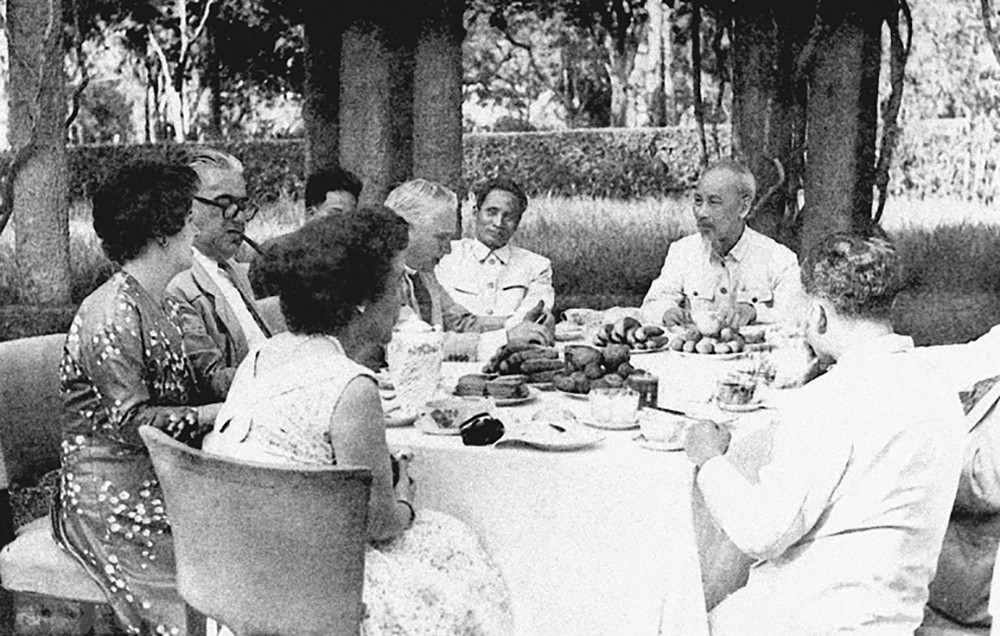 |
| President Ho Chi Minh received a delegation of British Parliamentarians visiting Vietnam (May 4, 1957). Photo: Archive |
Uncle Ho's style was always urgent like a soldier, yet calm like a philosopher, flexible yet steadfast, noble yet practical, extremely simple yet very elegant, caring about the big things, not forgetting the small things, seeing the forest and seeing each tree. All of these things formed the decisiveness, sincerity, beautiful personality, profound international knowledge and vision, unparalleled charisma, outstanding ability to work and the righteous and generous spirit in the personality of President Ho Chi Minh.
Today's Nghe people are living in a market economy, a multi-dimensional, multilateral, globalized knowledge economy, so they are more open, flexible, and adaptable to overcome.“poverty”, “the difficult things”. Therefore, learning from Uncle Ho is not only about solidarity, mutual love, but also about flexibility, integration, knowing how to apply and absorb flexibly to find appropriate measures, creating trust in internal and external methods, in order to promote one's strengths and advantages. Nghe An people learning from Uncle Ho also promote their own good values, traditions, and inherent virtues to assert themselves, to integrate and develop.

.jpg)
.jpg)
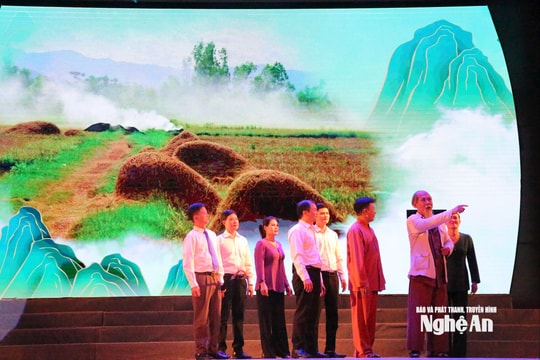
.jpg)
